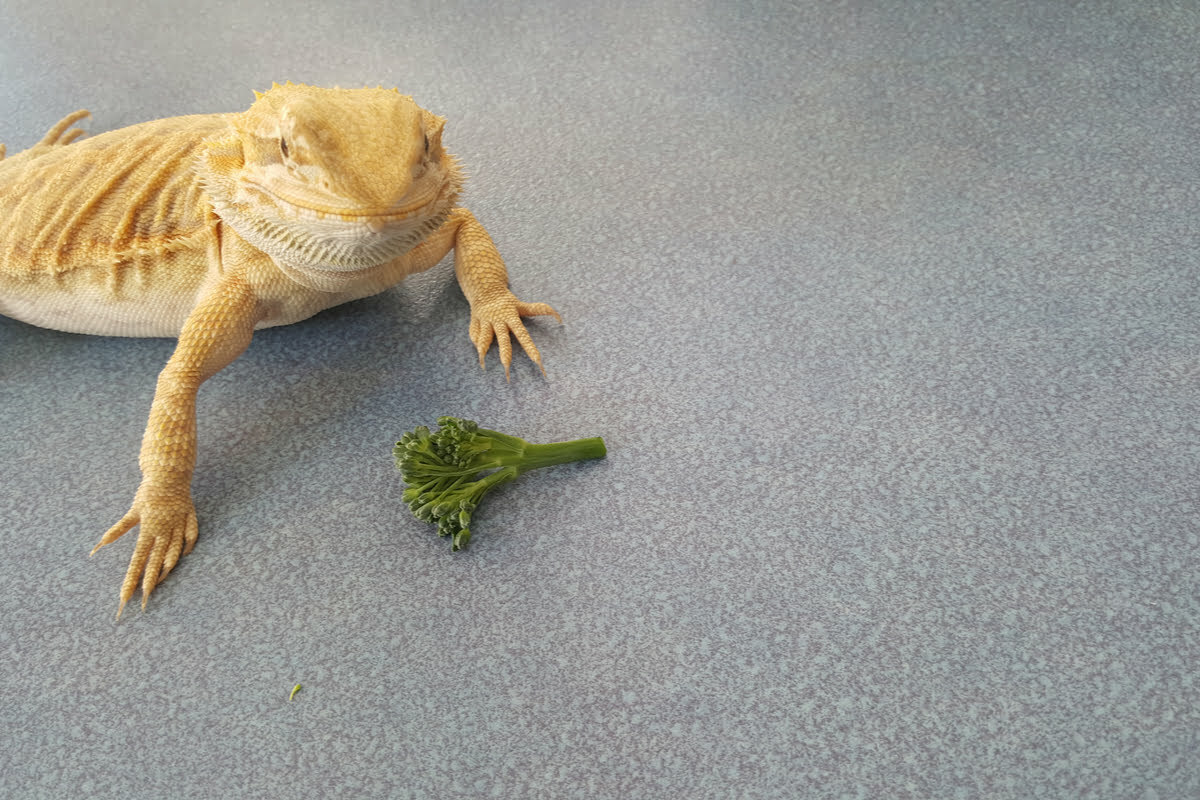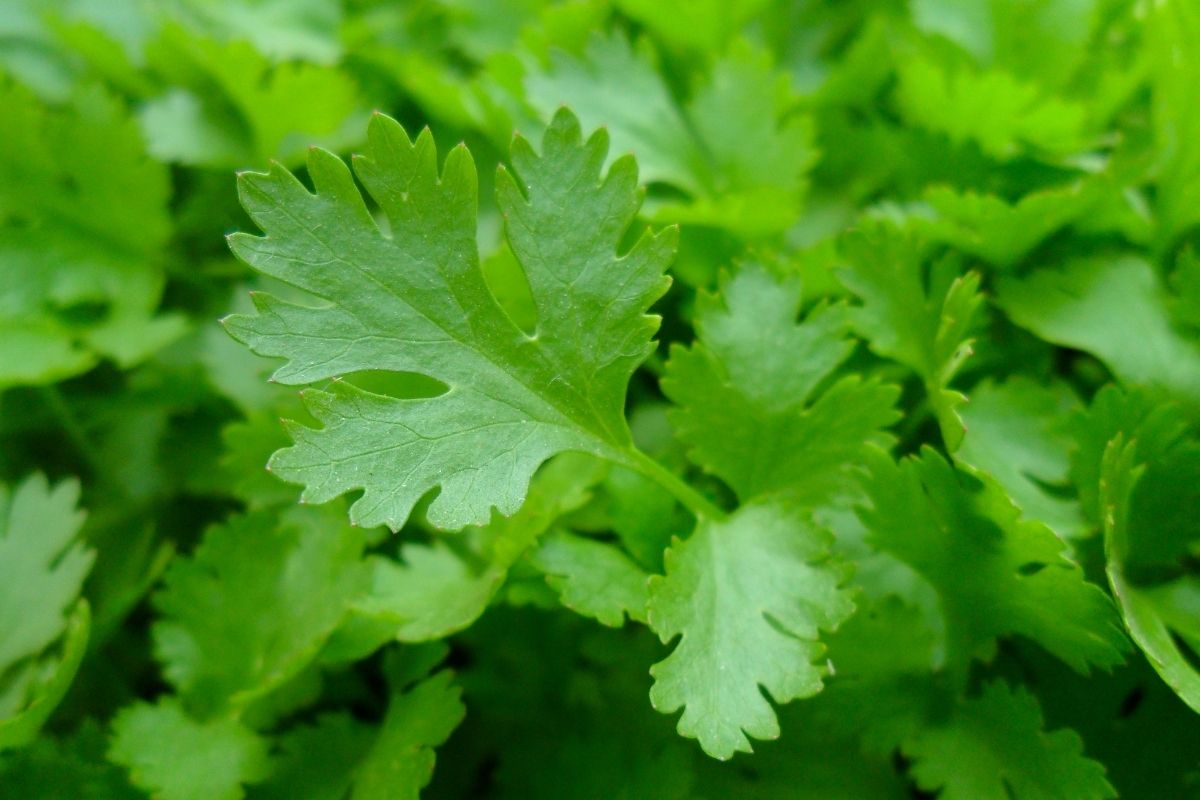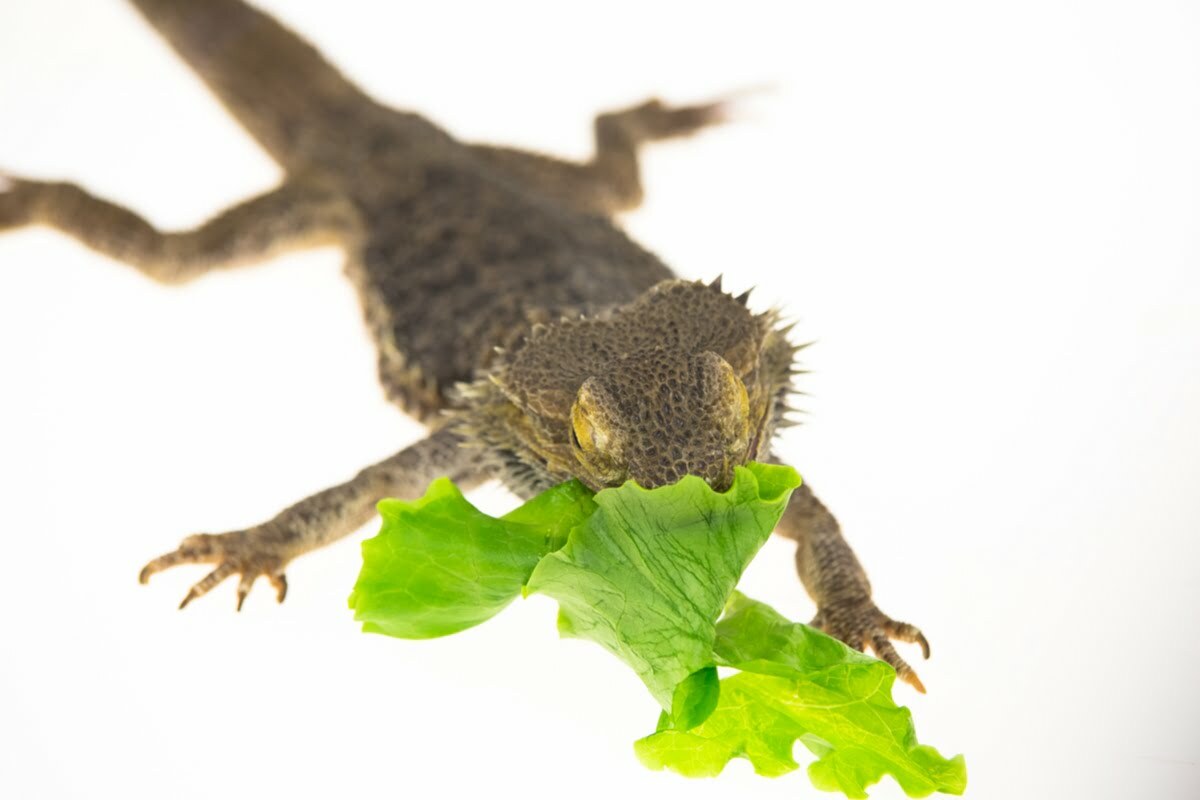Parsley is a common garnish used for cooking and decorating. It’s widely loved and appreciated by people all over the world, but can you feed it to your beardie?

If you would like to try feeding your dragon parsley, you should check this article out. Here, we will be going through everything you need to know about bearded dragons and parsley. Hopefully, you will learn something interesting!
About Parsley
Parsley is commonly grown as an ornamental plant in gardens because of its lovely green foliage and bright blue flowers.
It also serves as a good source of vitamin C and iron, which are essential nutrients that your beardie needs to stay healthy.
The leaves of parsley contain a high amount of calcium, so they’re great for your beardies’ teeth. They also have a lot of antioxidants, such as luteolin and apigenin, which help keep your beardie healthy.
The flowers of parsley contain a variety of vitamins and minerals, including B vitamins and a number of other great nutrients. These elements make up the basis of your beardie’s diet.
If you were wondering about the nutrition of parsley per 100g, check out these numbers:
- Water – 87.71 g
- Energy – 36 Kcal
- Protein – 2.97 g
- Total fat – 0.79 g
- Carbohydrates – 6.33 g
- Fibers – 3.3 g
- Sugars – 0.85 g
- Calcium – 138 mg
- Phosphorus – 58 mg
- Sodium – 56 mg
- Vitamin C – 133 mg
- Iron – 4.2 mg
- Vitamin D – 0 µg
- Vitamin B6 – 0.09 mg
- Vitamin A – 421 µg
- Vitamin E – 0.75 mg
- Vitamin K – 1640 µg
Is Parsley Good For Beardies?
It can be difficult to tell if something is good for your beardie just by looking at numbers on a list.
To make things a little easier to decipher, we’ll go through the two main things you should know about parsley and how they affect your beardie.
The Good – Rich In Calcium
As we already know, calcium is crucial for bearded dragons. Most vegetables have some form of calcium, but not much.
Parsley contains a large amount of calcium, which seems to make it a perfect choice for your beardie. As a critical part of their everyday diet, parsley could be seen as a great choice of food for beardies.
If you don’t know a lot about beardies and their health issues, we’ll catch you up. One of the worst conditions that can impact beardies is called metabolic bone disease.
Metabolic bone disease happens to a dragon when they either do not get enough calcium through their diet or are unable to process the calcium in their bodies properly.
This can happen when the animals do not get the correct lighting in their terrariums or by simply not getting calcium.
The metabolic bone disease will soften bones in bearded dragons, leaving them weak and brittle. When this occurs, it’s very easy for the beardie to break their tailbone or legs.
Fortunately, there is one thing that can prevent metabolic bone disease from happening. That is having a proper calcium intake.
Luckily for your beardie, parsley is rich in calcium, so it can help prevent metabolic bone disease, right?
As you can see from the nutritional values above, 100g of parsley contains 138 mg of calcium. So, your beardie would get plenty of calcium from eating parsley. If that’s the case, why is there that heading below this section?
The Bad – A Lot Of Oxalates
Parsley sounds like a great addition to your beardie’s salads, doesn’t it? Well, don’t get ahead of yourself. There is some conflicting evidence when it comes to whether parsley is good for beardies or not. Why? Because of oxalates.
Not sure what oxalates are? Don’t worry; not many people do. Oxalate is an organic compound found in plants that has a chemical formula of C4O4H2.
It’s actually quite common in nature and a major component of plant cells. However, most of us aren’t aware of how dangerous they really are.
We’ve all heard of oxalic acid being used to treat kidney stones, and even though it works, it isn’t necessarily safe.
Oxalates can cause problems with the kidneys, liver, bones, and heart in humans. In reptiles, oxalates can cause kidney damage and also interfere with their digestion system.
They can also cause constipation, diarrhea, and even death. The reason these effects occur is that oxalates are toxic to the body.
Now, let me ask you a question: How often does your beardie eat parsley? And if you answered once a week, then you might be surprised to hear that you should probably stop feeding it to your beardie.
A lot of veterinary professionals state that feeding your bearded dragon parsley is perfectly safe and even recommended.
However, because of the high levels of oxalates found in it, you might want to reconsider.
For comparison, here are the amounts of oxalates found per 100 g in parsley, spinach, and kale:
- Parsley – 1,700 mg
- Spinach – 970 mg
- Kale – 20 mg
How Does Parsley Taste Like To Your Beardie?

If you’ve never tried feeding your bearded dragon parsley before, then you might not know what it tastes like.
In order to figure out how much parsley your bearded dragon likes, you’ll need to experiment with different amounts of parsley on various foods.
You can use fresh parsley or dried parsley. Fresh parsley is the better option since you can add it to your beardie’s salads. However, before you do that, you should learn a little more about parsley and dragons.
There is some interesting information out there that is easily overlooked.
Is it Okay For Baby Beardies To Enjoy Parsley?
The same rules apply to baby beardies. The calcium is great, but the oxalates are a risk. If you do decide to feed your dragons some parsley, you will need to be careful of how much you give them.
When it comes to baby beardies, one of the most important things you need to do is give them nutritionally high foods.
If you definitely want to incorporate parsley into your beardie’s diet, do so in small quantities. Mix it with other healthy vegetables (like kale) so that they get all the protein and calcium they need to grow.
How Often Can You Feed Your Beardies Parsley?
Since some experts believe that parsley should be a staple part of a bearded dragon’s diet, this question is very difficult to answer.
Any research that has proven that parsley is healthy because of the calcium can be contradicted because of the oxalates.
In the end, everything will come down to common sense. It’s hard to determine how much of anything you should be feeding your beardies, and parsley is no different.
Before giving any animal a serving with their food, you should make sure that they don’t have a bad reaction to it. Any creature may have allergies, so you should just be safe.
If your beardie doesn’t have a reaction to it, you can incorporate small amounts into their food. Parsley should not be fed to beardies more than once a week.
Ideally, they should only be given it once a month or less. By doing this, you will allow your beardie to get the benefits from the parsley, but they won’t be overloaded with dangerous oxalates.
Feeding Parsley To Your Beardie
It’s important to clean parsley before you feed it to your bearded dragon. This should be the case with any kind of fruit or vegetable since there could be herbicides or pesticides on it.
If you’re using fresh parsley, wash it thoroughly under running water. If you’re using dried parsley, soak it in warm water for five minutes, then strain and rinse it again.
Once you’ve cleaned your parsley, cut it up into smaller pieces. To do this, you can use a knife or scissors. It doesn’t matter. You should try to avoid chopping it too finely, as this will cause your beardie to choke on it.
Instead, chop it into bite-sized pieces. Try to keep the parsley at least an inch long so that your beardie gets enough surface area to eat it.
What Can You Feed Your Beardie As An Alternative?

If you aren’t happy to feed your bearded dragon parsley, that’s totally fine. After reading everything about it in this article, no one would be surprised.
The risk of oxalates is too much for some reptile owners, and sometimes it’s better to avoid them when you can. So, what else can you feed your beardie? A lot, actually!
Below are five of the most popular vegetables or greens that are fed to bearded dragons. These food choices are very nutritional and are low in oxalates, so you have less to worry about!
Swiss Chard nutrition values per 100 grams:
- Water – 92.66 g
- Energy – 19 Kcal
- Protein – 1.8 g
- Total Fat – 0.2 g
- Carbohydrates – 3.74 g
- Fiber – 1.6 g
- Sugars – 1.1 g
- Calcium –51 mg
- Phosphorous – 46 mg
Bok Choy nutrition values per 100 grams:
- Water – 95.32
- Energy – 15 Kcal
- Protein – 1.5 g
- Total Fat – 0.2 g
- Carbohydrates – 2.18 g
- Fiber – 1 g
- Sugars – 1.18 g
- Calcium – 105 mg
- Phosphorous – 37 mg
Kale nutrition values per 100 grams:
- Water – 89.63 g
- Energy – 35 Kcal
- Protein – 2.92 g
- Total Fat – 1.49 g
- Carbohydrates – 4.42 g
- Fiber – 4.1 g
- Sugars – 0.99 g
- Calcium – 254 mg
- Phosphorous – 55 mg
Mustard Greens nutrition values per 100 grams:
- Water – 90.7 g
- Energy – 27 Kcal
- Protein – 2.86 g
- Total Fat – 0.42 g
- Carbohydrates – 4.67 g
- Fiber – 3.2 g
- Sugars – 1.32 g
- Calcium – 115 mg
- Phosphorous – 58 mg
Dandelion Greens nutrition values per 100 grams:
- Water – 85.6 g
- Energy – 45 Kcal
- Protein – 2.7 g
- Total Fat – 0.7 g
- Carbohydrates – 9.2 g
- Fiber – 3.5 g
- Sugars – 0.71 g
- Calcium – 187 mg
- Phosphorous – 66 mg
Final Thoughts
How do you feel about feeding your bearded dragon parsley now? Despite the fact that it’s full of calcium, the oxalate issue seems to outweigh that.
In my opinion, it’s best to limit your bearded dragon’s intake of oxalates, rather than give them something that might make them sick.
It’s also extremely important to remember that your bearded dragon needs lots of calcium, which comes from a variety of sources, not just parsley.
Remember how we said that parsley shouldn’t be fed more than once a week? If you are adamant about feeding your beardie parsley, please make sure to limit it.
It’s better to be on the safe side than accidentally causing harm to your wonderful pet.
Frequently Asked Questions
Is It Okay To Put Parsley In My Beardie’s Salad Bowl?
You shouldn’t put parsley in your bearded dragon’s salad bowl every day. Instead, feed them parsley every month or so, or else you run the risk of them having too many oxalates from the parsley.
Why Is A Balanced Diet Essential For Bearded Dragons?
Health. A balanced diet is crucial for bearded dragons because their diets should contain all the nutrients they need to stay healthy.
What Are The Key Nutrients That Beardies Need?
Calcium is the most important thing that all bearded dragons require. Other key nutrients include protein and vitamin D3. Without these, a bearded dragon will become sick and even die.
Can You Give Me Beardie Parsley On A Regular Basis?
No. You should not be feeding your bearded dragon parsley on a regular basis. This is because parsley is full of oxalates, which are harmful to reptiles. Instead, you can give them parsley every month in small amounts.
That way, they will get the nutrients from the parsley without consuming too much.
Which Vegetables Have High Amounts Of Calcium?
Vegetables like kale, collard greens, and spinach are high in calcium. This means they are great options to feed your bearded dragon.
Does Parsley Have Key Nutrients For Beardies?
Yes, parsley contains a lot of calcium. However, it is also full of oxalates, which are not good for beardies.
Are Baby Bearded Dragons Easy To Care For?
Yes, baby bearded dragons are pretty easy to care for. You need to feed them well and make sure they have enough lighting.
If you’re looking to start a baby bearded dragon, then yes, they are relatively easy to take care of. They require less food and water compared to adult bearded dragons.
You’ll be fine if you keep an eye out for any problems.
Can Baby Bearded Dragons Eat Parsley?
Yes, baby beardies can eat small amounts of parsley. However, bearded dragon owners should be very careful about how much parsley they give to their pets.
What Are The Best Beardie Foods?
Kale, spinach, mustard greens, Swiss chard, and dandelion greens are all great options for beardie food. These vegetables have high amounts of calcium and other great nutrients for your beardie.
Can I Feed Parsley To My Dragon In Moderation?
Yes, you can give your beardie small amounts of parsley every month or so. Be careful not to overdo it, or else the oxalates could harm your pet.
What Are Some Nutritious Greens To Feed My Beardie?
Kale, spinach, mustard greens, Swiss chard, and dandelion greens are all great options for beardie food. These vegetables have high amounts of calcium and other great nutrients for your beardie.
How Do You Know If Your Bearded Dragon Has Enough Vitamins?
A bearded dragon should have a healthy appetite, but it doesn’t mean they’re getting enough vitamins. If your dragon is exhibiting normal behavior and has a healthy appetite, chances are they are fine and healthy.
What Happens If A Bearded Dragon Doesn’t Get Enough Calcium?
If your beardie doesn’t get enough calcium, they will develop metabolic bone disease. If a beardie has metabolic bone disease, they will lose weight and might suffer from depression.
In extreme cases, they may even starve themselves to death. They will eventually become weak and frail and can no longer move around normally.
